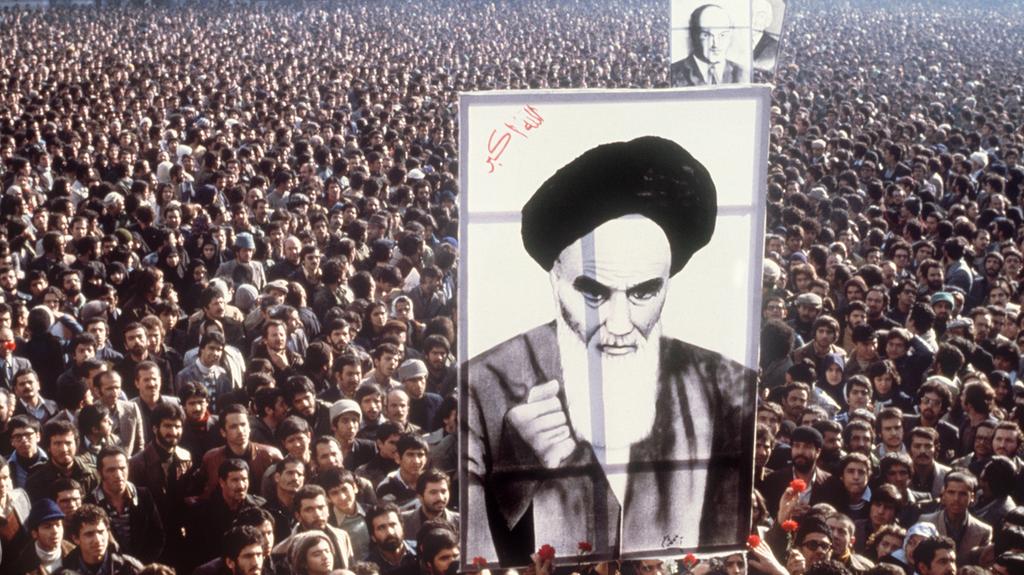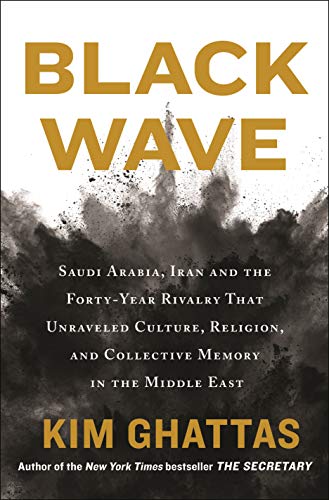Australia/Israel Review
Biblio File: The Year the Sky Fell
Apr 6, 2020 | Michael Totten

 Black Wave: Saudi Arabia, Iran, and the Forty-Year Rivalry That Unraveled Culture, Religion, and Collective Memory in the Middle East
Black Wave: Saudi Arabia, Iran, and the Forty-Year Rivalry That Unraveled Culture, Religion, and Collective Memory in the Middle East
by Kim Ghattas, Henry Holt and Co., 2020, 400 pp., A$49.95
In the greater Middle East, the year 1979 felt like the end of the world. Westerners know it as the ominous date of the Iranian Revolution, the hostage crisis, and the rise of the grim-faced, murderous Ayatollah Khomeini.
But those weren’t the only pivotal events that unfolded back then. The scarcely known siege of Mecca occurred at the same time, and it was equally dreadful – and fateful. In an effort to appease an armed insurrection, the Saudi government sharply reversed what precious little social progress had been made and, in a revolution from above, transformed the country into an even more regressive and repressive place than it already was.
The Saudi and Iranian governments, once grudging allies, became sworn, bitter enemies determined to export their own revolutions to the whole Muslim world, across the Middle East and beyond.
Nearly all the worst disasters that have swept across the Muslim world in the past four decades can be traced, at least in part, back to that year. That’s the thesis of the masterful book Black Wave, by Beirut-born, Emmy Award-winning journalist Kim Ghattas. She travelled from Egypt and Iraq to Iran and Pakistan, and no matter where she went, the people with whom she spoke let loose a tsunami of emotion when she asked how that year had devastated them and their countries: “Everyone had a story about how 1979 had wrecked their lives, their marriage, their education, including those born after that year.”
Even close observers of the region can be forgiven for not quite realising that things are much worse now than they used to be.
The Middle East in the mid-20th century was hardly a utopia. Authoritarianism was the norm, with rule by Turkish and European empires only recently shrugged off. But aside from the Arab-Israeli conflict, the wars were less endless, the culture more open, and sectarian mass murder a thing out of the history books. Beirut, Cairo, and even Kabul, enjoyed semi-liberal golden ages before sliding into decline. Iran under the leadership of the authoritarian yet progressive Shah Mohammed Reza Pahlavi was pro-Western, had friendly relations with Israel, and seemed to have a shining future ahead of it.
Ghattas treads familiar ground describing the Iranian Revolution and its cruel aftermath, but the Saudi half of the story is less well-known to her Western audience. While the Ayatollah railed against the Shah and his Western allies in Teheran, 300 totalitarian-minded Saudi insurgents from the spectacularly backward Najd desert captured the Grand Mosque in Mecca, took thousands of hostages, and engaged in a deadly standoff with the government. The Saudi royal family couldn’t break the siege on its own, so it resorted to summoning French paratroopers – to a city where non-Muslims are otherwise banned forever from entering – to lay waste to the rebels. What could have, and arguably should have, been an isolated event, instead marked a turning point.
The insurrectionists had a list of demands for Saudi Arabia: Sever ties with the West, stop exporting oil to the imperialists, banish all foreigners, and purge impure clerics. As Ghattas points out, these demands weren’t terribly different from former Al-Qaeda leader Osama bin Laden’s years later, and they created a terrible crisis for the House of Saud. Its custodianship of Mecca and Medina is the foundation of its leadership of the Islamic world, and if it can’t handle the job, perhaps it should be given to somebody else.
The hopelessly reactionary blind cleric Abdul Aziz bin Baz stepped forward and effectively forced the royal family to go all-in on the exquisitely bigoted Wahhabi subsect of Sunni Islam, and the royals felt obliged to do so lest the insurgency gather strength and remove them from power.
Women weren’t allowed to anchor the news anymore. Their faces were scrubbed from newspaper photos, and they were fired from their jobs and sent home. Beach resorts were closed. Whip-wielding authorities forced citizens to pray five times a day.
Simultaneously in Iran, Ayatollah Khomeini banned dancing and alcohol. Children were told they’d have molten metal poured into their ears on Judgement Day if they listened to music. Khomeini’s revolutionaries burned down movie theatres and other supposedly decadent businesses.
The Shah’s regime was brutal, but he wouldn’t even qualify as a water boy in the league Khomeini played in. The new Islamic government, “in a paroxysm of depravity,” executed 75 times as many people as the Shah’s notorious secret police, SAVAK.
There were two Islamist revolutions in 1979, not just the more infamous Iranian one. As if they didn’t constitute enough hell to be unleashed at once, Soviet tanks rolled across the border from Uzbekistan into Afghanistan to prop up a local Communist government. The United States jumped in and backed a movement of Islamic fighters, hoping to give Moscow its own black eye after the humiliating Vietnam War. The Saudis waded in, too, not just to punch back at the Eurasian heathens, but to keep the Russians out of Pakistan, bolster their own bona fides as the Muslim world’s leaders after being challenged in Mecca, and provide a pressure-release valve for their own fanatics.
But the Saudis had too many extremists to export; their narrow-minded religious and education establishment kept creating more of them as if it were running an assembly line. The 9/11 hijackers, almost all of whom were Saudi, “did not stand out in their country; they were unremarkable, representing the average Saudi man of that generation, the generation of 1979, the fateful year around which most of them were born.”
Over the next several decades and going all the way up through to the present, Iran armed and trained sectarian Shi’ite militias – Hezbollah in Lebanon, the Mahdi Army in Iraq, the Houthis in Yemen, and so on – to wage civil wars inside their own countries and wars against “imperialist” non-Muslims such as Americans and Israelis. The Saudis, meanwhile, spent untold billions of petrodollars exporting their harsh and alien Wahhabi doctrines to distant countries with no such tradition. And they backed their own totalitarian proxies when they found it useful, from Saddam Hussein in Iraq to the Taliban in Afghanistan. The region-wide export of these twin revolutions is the “Black Wave” of Ghattas’ title, “the torrent that flattens everything in its path” and that has “changed who we are and hijacked our collective memory.”
The Iranians have even chosen to back non-Shi’ite militias and terrorist organisations in the Palestinian territories, not because the ayatollahs have any warm feelings for the drinkers and womanisers in the Palestine Liberation Organisation or the Sunni fundamentalists of Hamas. Instead, the Iranians, as Shi’ites and Persians, hoped to win support as the hegemons of a Sunni-Arab-majority region by hitching a ride on the anti-Zionist train, a move that was particularly effective after Egypt had “betrayed” that cause by signing a peace treaty with Israel.
Hatred between the Saudis and the Iranians is more than political; it’s personal and visceral. Khomeini once blasted the Saudis as “the camel grazers of Riyadh and the barbarians of Najd, the most infamous and the wildest members of the human family.” The Saudis, for their part, fear and loathe the Iranians as Persians and heretical Shi’ites who might one day sponsor an anti-royal insurgency in the heavily Shi’ite Eastern Province, which just happens to be where most of the oil is.
Beyond the oppressed and murdered victims in their own countries, the Saudi–Iranian rivalry has so far killed millions in Iraq, Syria, Lebanon, Yemen, and Afghanistan. The “black wave” has even washed over countries where the Saudis and the Iranians haven’t faced off directly or through their proxies. Egypt has seen a dramatic decline, partly because so many from its poorer classes have spent time as temporary workers in Saudi Arabia and come home transformed into ultra-conservative quasi-Wahhabis, and also because the Egyptian middle class has since rejected the West and turned to the Saudis for inspiration and fashion.
The Saudi-Iranian rivalry for supremacy in the Middle East is as central to, and defining of, that region’s modern history as the American-Soviet rivalry was to Europe’s between 1945 and the fall of the Berlin Wall.
Those who choose to blame the Arab-Israeli conflict or American foreign policy blunders for most of the Middle East’s ills are drastically wide of the mark. Syria’s civil war, which scarcely involves Americans or Israelis and emphatically involves the Saudis and the Iranians (and the Russians), exposes the “blame America” and “blame Israel” crowds as the blinkered fools that they are. Ghattas barely touches on this in her book, but she doesn’t have to. It’s obvious.
Michael J. Totten is the author of nine books, including Where the West Ends and The Road to Fatima Gate. © Commentary magazine (www.commentarymagazine.com), reprinted by permission, all rights reserved.
Tags: Iran, Middle East, Saudi Arabia






